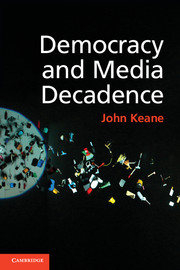2 - Monitory democracy
Published online by Cambridge University Press: 05 June 2014
Summary
It was noted earlier that the emergent world of communicative abundance demands a fresh sense of how real-world democracies are being affected by the new techniques and tools of communication. The short-hand recommendation harboured a sense of urgency: it implied the need to stop thinking in terms of the dead concepts and worn-out formulae of our predecessors; to become more attuned to the novelties, achievements and promise of our own times; to ask fresh and more imaginative questions, including how we understand democracy itself. In order to explore the point further, let us suppose for a moment that the handful of trends sketched above are by no means transitory, such that new information banks, changes in the public–private relationship and the growth of muckraking, unelected representatives and cross-border publics are together having real effects on the spirit and institutional dynamics of democracy. The questions then surface: with which kind of democracy are they interwoven?; and what exactly is their impact?
Most observers would reply by acknowledging that important things are happening in the field of democracy and communications. But diffuse agreement beyond that elementary point quickly crumbles into divisions of opinion about the meaning of democracy and the extent of the changes. Some observers draw the conclusion that the changes are proving to be minimal because traditional ‘offline’ political actors and organisations are moving online and slowly but surely colonising the new world of ‘cyberspace’, so that the new situation mirrors what came before and online politics remains ‘politics as usual’. A prime example, say these observers, is the way that the campaigning strategies of political parties now include teams of political strategists, video producers, code writers, data analysts, corporate marketers and Web producers sifting information gleaned from Facebook, Twitter subscribers, voter logs and feedback from telephone and in-person conversations. Opposite views are championed by those for whom communicative abundance brings into being a new architecture of politics, a flourishing world of ‘liquid democracy’, active ‘e-citizenship’ in direct and participatory form, a form of ‘e-democracy’ that resembles, in higher form, the assembly democracy enjoyed by Greek democrats. In between these extremes stand observers who praise communicative abundance for the modest ways it breathes life into ‘liberal democracy’ by enabling better ‘informed citizens’ to find a new or stronger voice in public affairs.
- Type
- Chapter
- Information
- Democracy and Media Decadence , pp. 77 - 108Publisher: Cambridge University PressPrint publication year: 2013



